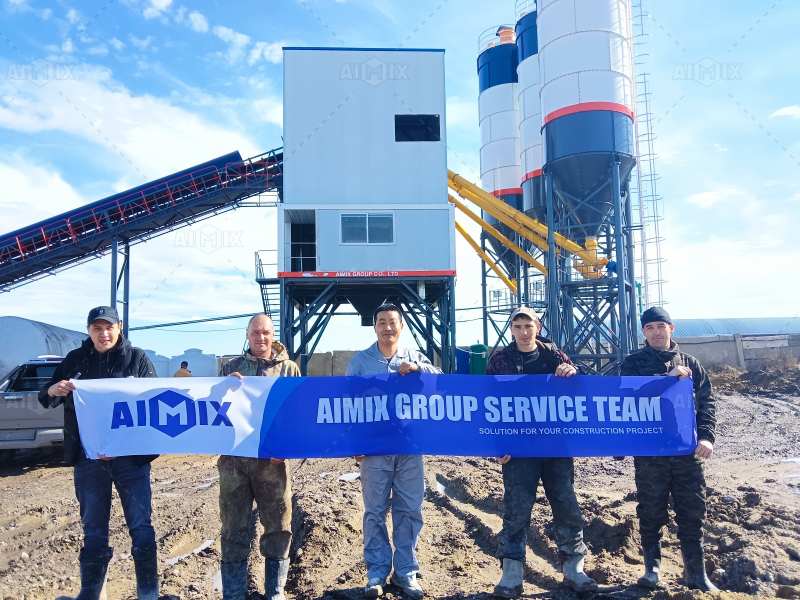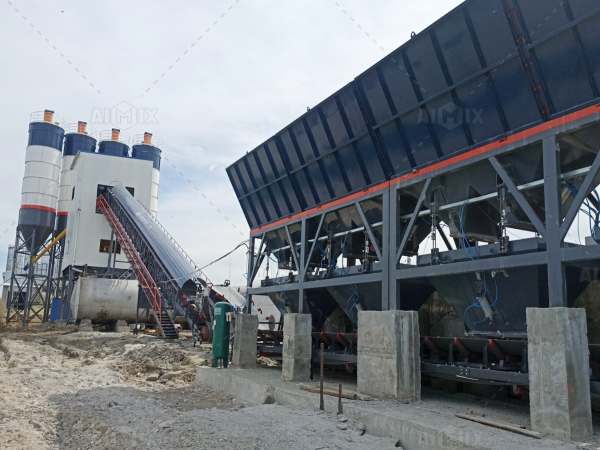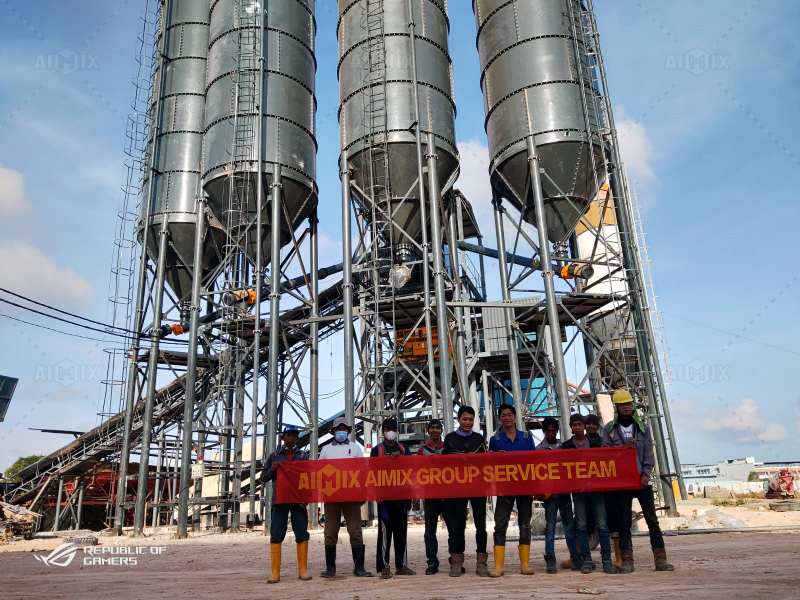The pricing of concrete batching plants, including ready mix concrete plants for sale (RMC plants) and small concrete batch plants for sale, is influenced by various factors, one of the most significant being economic conditions. The demand for construction materials, labor costs, fuel prices, and raw material availability are all closely tied to the economic climate. As the construction industry is essential for economic growth, fluctuations in the economy can have direct implications on the pricing and availability of concrete batching plants. In this article, we will explore how different economic conditions impact the sale prices of concrete batching plants and discuss how potential buyers can navigate these challenges.

The Influence of Economic Conditions on Concrete Batching Plant Pricing
Supply and Demand Dynamics
Economic growth or recession plays a critical role in determining the demand for construction materials, including concrete. During periods of economic expansion, the construction industry often sees an uptick in infrastructure and commercial development, which leads to an increased demand for concrete. This higher demand can drive up the prices of concrete batching plants for sale, including large ready mix concrete plants (RMC plants) and small concrete batch plants for sale.
Conversely, during economic downturns, construction projects may slow down or be delayed, leading to a decrease in demand for concrete batching plants. In such times, sellers may lower prices or offer discounts in order to attract buyers, as the demand for new plants dwindles. Buyers may find an opportunity to purchase equipment at a reduced cost during economic slowdowns, especially if manufacturers or suppliers are eager to move inventory or clear stock.
Raw Material Costs
Concrete batching plants rely on various raw materials, such as steel, cement, and aggregates, to produce concrete. The prices of these materials fluctuate based on global economic conditions, trade policies, and supply chain issues. For instance, during periods of economic growth, global demand for construction materials increases, pushing up prices for steel and cement. This increase in raw material costs directly impacts the price of concrete batching plants, as manufacturers face higher production costs.
In contrast, during times of economic uncertainty, raw material costs may stabilize or even decrease as global demand softens. This may lead to lower costs for manufacturing concrete batching plants, which can translate into lower prices for buyers. Similarly, trade restrictions or tariffs imposed during economic tensions can lead to price hikes for raw materials, pushing the cost of concrete batching plants higher.
Fuel and Energy Costs
The cost of fuel and energy is another economic factor that affects the pricing of concrete batching plants. Concrete batching plants require a significant amount of energy to operate, especially when producing large volumes of concrete. The costs associated with electricity, fuel for transportation, and other energy-related factors are directly tied to the overall economic environment.
For example, during periods of high fuel prices, manufacturers may pass on those costs to customers in the form of higher plant prices. On the other hand, when energy costs are lower, concrete batching plants for sale may see more favorable pricing. Fluctuations in fuel costs can also impact delivery charges for concrete batching plants, particularly for small concrete batch plants for sale that are often shipped to specific job sites.
Labor Costs and Availability
Labor costs are another key economic variable that directly affects the cost of manufacturing and operating concrete batching plants. In a thriving economy, labor shortages may occur due to high demand for workers across industries, which can lead to rising wages. These increased labor costs can affect the overall pricing of concrete batching plants, as manufacturers need to account for higher production costs.
Alternatively, during an economic recession, labor markets often become less competitive, and wages may stabilize or even decrease, potentially reducing the cost of manufacturing concrete batching plants. This could lead to more affordable pricing for buyers, especially for smaller plants, such as small concrete batch plants for sale, which require less complex manufacturing processes.

Currency Exchange Rates and Global Trade
The global nature of concrete batching plant manufacturing means that exchange rates and international trade policies can significantly influence pricing. For buyers in countries with weaker currencies, the cost of purchasing a concrete batching plant from international suppliers may rise due to unfavorable exchange rates. Similarly, changes in trade tariffs or import/export regulations can increase or decrease the cost of plants imported from other countries.
For instance, if a buyer in a developing country is looking for a ready mix concrete plant for sale, they may face higher prices if their currency depreciates against the currency of the plant manufacturer. Conversely, strong currency values and stable trade policies can benefit buyers by reducing the overall cost of acquisition.
How Economic Conditions Influence Concrete Batching Plant Demand
Demand for Ready Mix Concrete Plants (RMC Plants)
Ready mix concrete plants, or RMC plants, are typically used for large-scale construction projects such as highways, bridges, and commercial buildings. When the economy is growing, government spending on infrastructure projects often increases, leading to higher demand for ready mix concrete plants. This demand increases the price of RMC plants for sale as suppliers work to meet the needs of the market.
On the other hand, during economic slowdowns, government and private investments in large-scale construction projects may decrease, leading to lower demand for RMC plants. As a result, the RMC plant cost may drop, and buyers can secure better deals. In addition, contractors may opt for smaller, more cost-effective alternatives, like small concrete batch plants for sale, to reduce their capital investment during tough economic times.
Growing Interest in Small Concrete Batch Plants for Sale
In periods of economic uncertainty, there is often an increased demand for small concrete batch plants for sale. These plants are more affordable and require less capital investment than larger ready mix concrete plants. Small concrete batch plants are popular among smaller contractors or businesses looking for flexibility and lower operational costs. They are often used for small-scale projects such as residential construction, road repairs, or limited infrastructure projects.
When economic conditions are uncertain, contractors may prefer investing in smaller, less expensive equipment that can be used for multiple types of projects. This helps them manage costs more effectively, especially when large construction projects are not guaranteed. Additionally, small concrete batch plants offer flexibility in terms of mobility and setup, making them an attractive option for projects that require quick setup and short-term use.

Financing and Credit Availability
During times of economic growth, access to financing tends to be more readily available, which can make it easier for companies to invest in concrete batching plants. Banks and financial institutions are more willing to offer loans for purchasing equipment like ready mix concrete plants or small concrete batch plants, given the optimism in the market.
However, during economic downturns, credit conditions may tighten, and lenders may become more cautious about approving loans. This can affect the affordability of concrete batching plants for sale, particularly for smaller businesses or contractors with limited capital. In such cases, manufacturers and suppliers may offer financing options or flexible payment plans to make the purchase more accessible.
Conclusion
Economic conditions play a vital role in influencing the pricing and availability of concrete batching plants for sale. From the cost of raw materials and fuel to labor market conditions and global trade dynamics, various economic factors can affect both the cost of manufacturing and the demand for plants. Buyers looking to purchase a ready mix concrete plant for sale, RMC plant, or small concrete batch plant for sale must stay informed about these economic conditions to make informed purchasing decisions.
In times of economic expansion, demand for large-scale concrete batching plants may drive up prices, while during economic slowdowns, buyers may find better deals as demand softens. Regardless of the economic climate, understanding these factors will help buyers navigate the market and make the right investment in their concrete production needs.